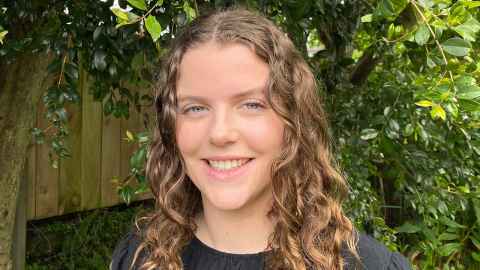Research and Development Commercialisation Assistant
Paula Jeune graduated with Bachelor of Science (Honours) with First Class Honours in Food Science and is now part of the team at New Zealand sustainable food venture, NewFish.

Career: Research and Development Commercialisation Assistant, NewFish
Programme: Bachelor of Science (Honours) in Food Science
“I think I was born thinking about food. It’s something I have had a keen interest in for as long as I can remember. I spent the majority of my childhood in the kitchen - cooking meals with my Mum and Nana, hosting MasterChef themed birthday parties and curating three course dinner menus for my family. I’ve also always had a strong curiosity and desire to understand how things work, so the sciences (biology, chemistry, physics) were my favourite subjects at high school and the areas I excelled in most.
“It seems like the obvious choice now, but food science wasn’t even on my radar until my later high school years - before that point I thought the only way to make a career out of food was to become a chef. It was my Dad that suggested I consider this avenue as he watched me concoct some strange Heston Blumenthal inspired dish in the kitchen of our family home. I scoffed at him initially, still thinking I would head into the health sciences, engineering or similar but I’m continually grateful that he suggested it to me. I love that food science encompasses all of these scientific disciplines, including product development which fulfils my creative side.
“Personally I think everyone should learn about sustainability, no matter what area of study they are interested in. The environmental issues that our society is currently facing are going to affect every single country, industry and person in some way shape or form, and it's going to take every single country, industry and person to cause any sort of change. I think if everyone had a basic level of education on the topic it could do more than having few experts.
“The thing I enjoyed most about the SUSTAIN 200 paper was the real varied range of topics that were covered. When it comes to ‘sustainability’ the first thing that tends to come to mind is environmental sustainability, but the syllabus went much deeper than that. Interwoven with the obvious topics like climate change, deep-sea fisheries and ocean acidification, were aspects of psychology and sociology.
“By analysing how humans evolved to cooperate, exploring apocalyptic narratives throughout history, and studying sustainable community models this course did a really great job of changing the lens through which I viewed sustainability. As the facts around the state of our planet can be pretty ‘doom and gloom’ sometimes, the course was well crafted to convey that they are issues we as a society are capable of solving, and inspire change.
Personally I think everyone should learn about sustainability, no matter what area of study they are interested in.
“I also really enjoyed the community feel of the paper. The lecturers were warm and open, and did an excellent job of facilitating collaboration amongst the class through their interactive lectures and tutorials. Oftentimes in lectures, people will sit silently and not interact with their peers but I found the inclusive nature of this course to be really refreshing. There was also a group project in which we had to develop a sustainability-themed game, which was a great way to further these relationships within the class, and develop the innovative thinking which will be required to find solutions to the sustainability issues we are collectively facing.
“For someone considering studies relating to sustainability, my advice would absolutely be to integrate it into your studies wherever you can. Not everyone needs to dedicate their entire life to the topic, but it is surprisingly easy to make it an underlying theme - when selecting research essay topics, choosing elective papers (like Sustain200), coming up with project ideas and applying for internships. Sustainable practices are becoming increasingly entrenched in everything we do as a society, so even if you don't care about being an informed citizen within our global community, it will at least improve your career prospects!
“I love the multidisciplinary nature of food science; the way it combines elements of food chemistry, physics, human nutrition, sensory science, microbiology and product development, to name a few. There are so many directions that a food science degree can take you in and I find that sense of freedom very rewarding.
“I was fortunate enough to be the recipient of two University of Auckland Scholarships over the course of my studies. The first was the 2018 University of Auckland Top Achievers Scholarship, which funded my accommodation in halls of residence and course fees for my first year. This was immensely beneficial, not only to my academic success but to my wellbeing in general, as it meant I was able to put all of my energy into studying and forming solid friendships, without the additional financial stress of having to work a part-time job.
“In 2019 I also received a University of Auckland Summer Research Scholarship. This funding allowed me to complete four months of paid research over the summer, on a project of my choice. It was such a great insight into postgraduate study and ultimately confirmed to me that I was interested in pursuing my own research, in the form of a Postgraduate Honours. The academic guidance and general mentorship I received from my supervisor, Dr Lisa Pilkington, made the whole experience immensely rewarding and one I would not hesitate to recommend to others.”
We're always looking for stories to share from our passionate Science students.
If you have a story, we'd love to hear from you. Email science-web@auckland.ac.nz.